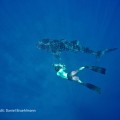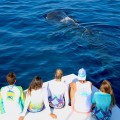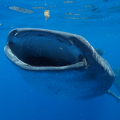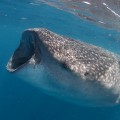NSU Newsroom
SharkBytes
Horizons
This version of NSU News has been archived as of February 28, 2019. To search through archived articles, visit nova.edu/search. To access the new version of NSU News, visit news.nova.edu.
This version of SharkBytes has been archived as of February 28, 2019. To search through archived articles, visit nova.edu/search. To access the new version of SharkBytes, visit sharkbytes.nova.edu.
Novel Approach Studies Whale Shark Ages the Best Way – While They Are Swimming
A newly published study also finds that they can live up to 130 years
FOR IMMEDIATE RELEASE
FORT LAUDERDALE/DAVIE, Fla. – Already the world’s largest shark species, male whale sharks can swim around the ocean for up to 130 years, according to a recently published study by scientists at Nova Southeastern University‘s (NSU) Guy Harvey Research Institute (GHRI) and collaborators from the Maldives Whale Shark Research Programme.
The research on whale shark aging growth dynamics, published in the Marine and Freshwater Research Journal, was conducted in the Republic of Maldives using a unique approach.
According to Cameron Perry, the first author of the scientific paper, and at the time a graduate student at NSU’s GHRI, “What makes this a novel approach is that we took repeated noninvasive underwater measurements of live sharks over the course of a decade.
“Up to now, such aging and growth research has required obtaining vertebrae from dead whale sharks and counting growth rings, analogous to counting tree rings, to determine age. Our work shows that we can obtain age and growth information without relying on dead sharks captured in fisheries. That is a big deal.”
You can read the full study ONLINE.
- Photo: GHOF
- Photo: GHOF
- Photo: GHOF
According to the research study, “Comparing length-measurement methods and estimating growth parameters of free-swimming whale sharks (Rhincodon typus) near the South Ari Atoll, Maldives,” taking repeated measurement of the same sharks over many years was possible because many of these sharks came back to the same place every one to two years, and individuals could be recognized by their unique spot patterns. The researchers then modeled their measurement results and found that:
- male whale sharks can live as long as 130 years (that means some whale sharks swimming the world’s oceans today were born when Grover Cleveland was President of the United States);
- whale sharks may grow as large as 61.7 feet on average, which is nearly 17 feet longer than a school bus.
“Growth and reproduction of whale sharks, which are endangered in many places, are poorly understood,” said Mahmood Shivji, Ph.D., director of NSU’s GHRI. “When you couple this lack of knowledge with the fact that whale shark products such as fins, meat and oil are highly valuable – they are harvested in many countries – one can quickly see the urgency in learning as much as possible in order to help save these majestic creatures.”
Perry agreed.
“The more we learn about these animals, their growth dynamics, where they go, what areas may be their nurseries, it can lead to a better understanding of their life history, which is imperative to guide conservation efforts,” he said.
Be sure to sign up for NSU’s RSS feed so you don’t miss any of our news releases, guest editorials and other announcements. Please sign up HERE.
###
About Nova Southeastern University (NSU): Located in beautiful Fort Lauderdale, Florida, NSU is ranked among U.S. News & World Report’s Top 200 National Research Universities and is a dynamic, private research university providing high-quality educational and research programs at the undergraduate, graduate, and first-professional degree levels. Established in 1964, NSU now includes 16 colleges, the 215,000-square-foot Center for Collaborative Research, a private JK-12 grade school, the Mailman Segal Center for Human Development with specialists in Autism, the world-class NSU Art Museum Fort Lauderdale, and the Alvin Sherman Library, Research and Information Technology Center, which is Florida’s largest public library. NSU has campuses in Fort Lauderdale, Fort Myers, Jacksonville, Miami, Miramar, Orlando, Palm Beach, and Tampa, Florida, as well as San Juan, Puerto Rico, while maintaining a presence online globally. Classified as a research university with “high research activity” by the Carnegie Foundation for the Advancement of Teaching, NSU is one of only 50 universities nationwide to also be awarded Carnegie’s Community Engagement Classification, and is also the largest private institution in the United States that meets the U.S. Department of Education’s criteria as a Hispanic-serving Institution. Please visit www.nova.edu for more information.
About NSU’s Halmos College of Natural Sciences and Oceanography: The college provides high-quality undergraduate (bachelor’s degree) and graduate (master’s and doctoral degrees and certificates) education programs in a broad range of disciplines, including marine sciences, mathematics, biophysics, and chemistry. Researchers carry out innovative basic and applied research programs in coral reef biology, ecology, and geology; fish biology, ecology, and conservation; shark and billfish ecology; fisheries science; deep-sea organismal biology and ecology; invertebrate and vertebrate genomics, genetics, molecular ecology, and evolution; microbiology; biodiversity; observation and modeling of large-scale ocean circulation, coastal dynamics, and ocean atmosphere coupling; benthic habitat mapping; biodiversity; histology; and calcification. The college’s newest building is the state-of-the-art Guy Harvey Oceanographic Center, an 86,000-square-foot structure filled with laboratories; offices; seminar rooms; an auditorium; and indoor and outdoor running sea water facilities. Please visit cnso.nova.edu for more information.
About NSU’s Guy Harvey Research Institute: Established in 1999, the Guy Harvey Research Institute (GHRI) is a collaboration between the renowned marine artist, scientist and explorer, Dr. Guy Harvey, and Nova Southeastern University. The mission of NSU’s GHRI is to provide the scientific information necessary to understand, conserve, and effectively manage the world’s marine fishes and their ecosystems. The institute is one of only a handful of private organizations dedicated exclusively to the science-based conservation of marine fish populations and biodiversity. The research, education and outreach activities of NSU’s GHRI are supported by the Guy Harvey Ocean Foundation, AFTCO Inc., extramural research grants, philanthropic donations by private businesses and individuals, and NSU. Please visit http://cnso.nova.edu/ghri for more information.
About the Guy Harvey Ocean Foundation: The Guy Harvey Ocean Foundation (GHOF) conducts scientific research and hosts educational programs aimed at conserving the marine environment. The GHOF also funds affiliated researchers working to better understand our ocean ecosystem and educators helping to foster the next era of marine conservationists. The GHOF will help ensure that future generations can enjoy and benefit from a properly balanced ocean ecosystem. Please visit www.GHOF.org for more information.
MEDIA CONTACTS
Joe Donzelli | NSU Office of Public Relations
954-262-2159 (o) | 954-661-4571 (c)
jdonzelli@nova.edu | www.nova.edu | @NSU_Joe
Carlos Goycochea
Pierson Grant Public Relations
954-776-1999, ext. 239
cgoycochea@piersongrant.com



